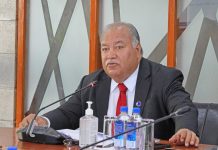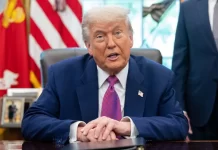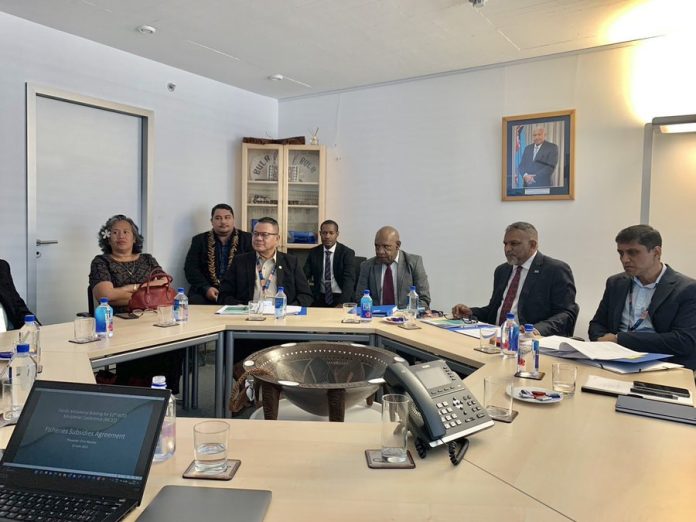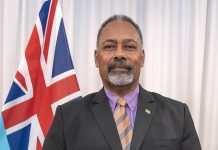The ability of Pacific Island Countries to manage their fish stocks are at risk if the World Trade Organisation (WTO) 12th Ministerial Conference (MC12) started Sunday in Geneva, passes an agreement to address declining fish stocks, which could unfairly impact our fishing industries.
Pacific Network on Globalisation (PANG) Campaigner Adam Wolfenden said from Geneva that the proposed WTO agreement, which targets Illegal, Unreported and Unregulated (IUU) fishing subsidies has also conveniently failed to address those most responsible for the problem- the bigger countries that have contributed to overfishing and declining global fish stocks.
The WTO proposed agreement aims to restrict fishing subsidies, a major contributor to overfishing with some exceptions for developing countries and least developed countries who depend on fish export earnings. This mandate was given to the WTO by leaders through the Sustainable Development Goal (SDG)14.6.
However, Wolfenden says the WTO is on track to fail that mandate due to changes in the text of the agreement.
“Those most responsible for overfishing and over-subsidisation are not being held accountable within the text of the agreement,” Wolfenden said. “There is no specific recognition of historical responsibility for the global state of fisheries stocks, and no attempts to assign actions accordingly to those people who created these problems. We have seen decades of subsidisation from industrial fishing nations and their fleets, but they are not being held to account within these negotiations and within the Chair’s texts.”
The text before Ministers contains prohibitions for subsidies for fishing overfished stocks as well as subsidies that contribute to overfishing and overcapacity however these are allowed if the stocks being fished are demonstrated to be managed at a biologically sustainable measure. It is up to each country to notify the WTO of its conservation measures if it wants to provide such subsidies.
“By requiring Members to demonstrate their conservation and management measures it allows other members to question them and challenge them. The Pacific Islands have seen numerous challenges to their management measures from developed fishing nations and this will provide them with an enforceable mechanism to do so again. This undermines Pacific sovereignty and all the hard work Pacific Island countries have done to manage fish stocks” Wolfenden continued.
Contained within the text are flexibilities for developing countries to provide subsidies that contribute to overfishing and overcapacity. These stringent flexibilities are a combination of a time bound exemption as well as tied to the meeting of several criteria.
“The flexibilities being offered to developing countries fail to meet the SDG mandate for special and differential treatment. They are contingent upon meeting the burdensome notification requirements, something many developing country members regularly fail to meet, effectively resulting in the loss of special and differential treatment for some Members. It is hard to imagine that this is not what the Leaders were imagining when agreeing to SDG 14.6” added Wolfenden.
Illegal fishing is defined as fishing without the permission of the country where the fishing is happening, while unreported is fishing that has not been reported or has been misreported to national authorities against the local laws. Unregulated fishing applies to fishing that goes against any conservation or management measures that a country has put in place.
The agreement proposes that countries must have laws, regulations, and administrative procedures in place to prevent harmful subsidies or payments to those involved in illegal, unreported, and unregulated fishing. This would mean that a lot of small-scale fishing in the region could be classed as ‘unreported’, and thus would have 2 years to comply before they risk losing their subsidies.
“Some of the governments in the Pacific don’t have the capacity to reform the fisheries sector or put in place the measures needed to eliminate IUU fishing, what we are going to see is that they will be forced out because of the prohibitions, and the subsidies provided within those governments and to communities possibly challenged or prohibited under the text.
“Sadly, it means small scale fishers will be caught up in this agreement and these are some of the most vulnerable communities within the fisheries sector and they rely on government subsidies to survive. They are also the least responsible for the state of global fish stocks,” Wolfenden said.
Last year, in the lead up to this meeting, 81 developing countries made it very clear they wanted special differential treatment to apply to not just small-scale fishers but to be a permanent flexibility for those types of countries.
The current proposal relating to small-scale fishers includes a carve-out of the text’s prohibitions for those fishers who are “low income, resource poor and livelihood fishing”, who would be allowed to receive subsidies for two years provided they fish within 12 nautical miles of the coastline.
This however could be a problem for small-scale fishers who regularly fish or want to regularly fish beyond that area, especially if they don’t have access to up-to-date fishing data on the status of stocks and regularly catch multiple species.
“Further, this is completely inadequate for a lot of these countries who want to develop their fishing fleets to fish domestic waters,” Wolfenden said.
PANG Coordinator, Maureen Penjueli says developing countries are being “framed” to take the blame if negotiations collapse come the 15th of June.
“A bad deal is a no deal, and we should be prepared to walk away,” Penjueli said. The risks to our economic lifeline are too high a price to accept to for a bad deal at this stage.
Last year, Solomon Islands Foreign Affairs and External Trade Minister, Jeremiah Manele said during a meeting of Pacific ACP countries that while the prohibition of fisheries subsidies would ensure the health and resilience of oceans and the sustainability of global fish stocks, states were pushing for the exemption of access fees, the exclusion of small-scale and artisanal fisheries, and for the removal of the unduly onerous and unfair reporting obligations on developing States, among others.
Australia, New Zealand, Fiji, Papua New Guinea, Samoa, Tonga, Vanuatu, and the Solomon Islands are members of WTO.
SOURCE: PANG/PACNEWS











